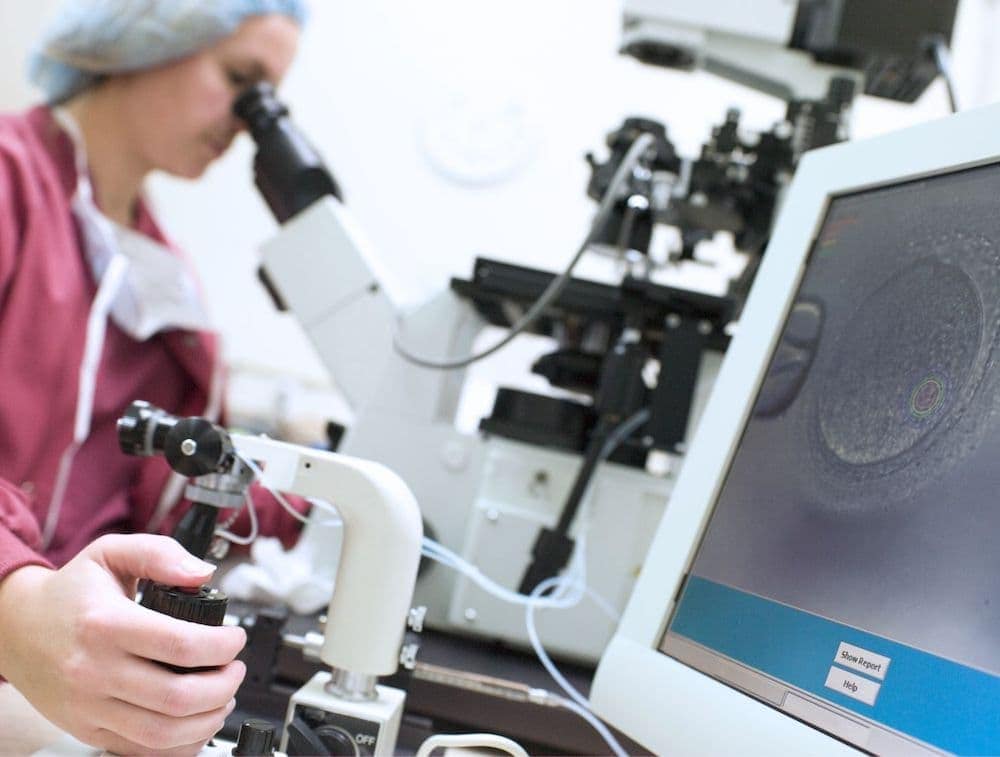What is ICSI and How Does it Work?
ICSI, or intracytoplasmic sperm injection, is a fertility treatment that involves the direct injection of a single sperm into an egg. This procedure is performed with in vitro fertilization (IVF). During IVF, eggs are retrieved from the woman's ovaries and fertilized with sperm in a laboratory dish. With ICSI, a single sperm is selected and injected directly into each egg, bypassing any potential barriers to fertilization.
The ICSI procedure begins with collecting eggs from the woman's ovaries. These eggs are then placed in a culture dish and examined under a microscope. A single sperm is selected and immobilized using a tiny needle. The needle injects the sperm directly into the egg. After the injection, monitoring the eggs ensures that fertilization occurs. Once fertilization is confirmed, the resulting embryos transfer to the woman's uterus.
Compared to other fertility treatments, such as IVF alone, ICSI offers a higher chance of successful fertilization. This procedure is particularly beneficial for couples who have struggled with male factor infertility, where the quality or quantity of sperm may be compromised due to various factors. ICSI can be helpful in cases where previous attempts at IVF have failed or when there are concerns about the ability of the sperm to penetrate the egg.
Who is a Candidate for ICSI?
Several factors may lead to the need for ICSI.
Male factor infertility is one of the most common reasons for considering ICSI. These factors include low sperm count, poor sperm motility, or abnormal sperm morphology. ICSI can also benefit couples who have experienced previous failed attempts at IVF or have had difficulty achieving fertilization with conventional IVF methods.
Medical Conditions and ICSI
In addition to male factor infertility, certain medical conditions may affect a couple's candidacy for ICSI. These include genetic disorders that are likely to get passed on to offspring, such as cystic fibrosis or Huntington's disease. ICSI can be used with preimplantation genetic testing to screen embryos for these conditions before being transferred to the uterus.
Age Requirements For ICSI
Age can also play a role in determining whether a couple is a good candidate for ICSI. As women age, their ovarian reserve decreases, making achieving successful fertilization and pregnancy more difficult. ICSI can help overcome some of these challenges by directly injecting sperm into the egg, increasing the chances of fertilization.
Preparing for ICSI: What to Expect
Before undergoing ICSI, couples typically have an initial consultation with a fertility specialist. During this consultation, the couple's fertility specialist will review their medical history and discuss any potential factors that may affect the success of ICSI. The fertility specialist may also order additional tests and evaluations to assess the couple's health and fertility potential.
Testing and Evaluations
Medical tests and evaluations may include blood tests to check hormone levels, ultrasounds to evaluate the woman's ovarian reserve and uterine health, and semen analysis to assess the quality and quantity of sperm. These tests will help the fertility specialist determine the most appropriate treatment plan for the couple.
Medications and Injections
In preparation for ICSI, the woman may be prescribed medications to stimulate her ovaries and promote the development of multiple eggs. These medications are generally administered through injections, and the fertility clinic will closely monitor progress and any side effects. The fertility specialist will also advise the woman to make specific lifestyle changes, such as quitting smoking, reducing alcohol consumption, and maintaining a healthy diet and exercise routine.

The ICSI Procedure: Step-by-Step
The ICSI procedure typically follows a specific timeline of events. First, the woman will undergo ovarian stimulation using medications to promote the development of multiple eggs. This step is essential to increase the chances of successful fertilization and pregnancy. During this time, the woman will be closely monitored through ultrasounds and blood tests to assess the growth and maturity of the eggs.
Once the eggs have reached the desired size and maturity, retrieval occurs through a minor surgical procedure called egg retrieval. This procedure is performed under sedation or anesthesia and involves the insertion of a needle into the ovaries to collect the eggs. The eggs are then placed in a culture dish and examined under a microscope.
Next, an embryologist selects a single sperm for each egg. The embryologist carefully examines the sperm under a microscope and chooses the healthiest and most viable sperm for injection. The selected sperm is immobilized using a tiny needle and injected directly into the egg.
After the injection, the eggs are monitored to ensure that fertilization occurs. The presence of two pronuclei confirms successful fertilization. The fertilized eggs, now called embryos, are cultured in the laboratory for a few days before being transferred to the woman's uterus.
Success Rates of ICSI: What to Expect
The success rates of ICSI can vary depending on several factors, including the age of the woman, the quality of the eggs and sperm, and the overall health of the couple. Generally, the success rates of ICSI are comparable to those of conventional IVF, but ICSI can improve your success rate.
Factors that may affect the success rates of ICSI include the woman's age and ovarian reserve. As women age, their ovarian reserve decreases, making achieving successful fertilization and pregnancy more difficult. However, ICSI can help overcome some of these challenges by directly injecting sperm into the egg, increasing the chances of fertilization.
A fertility specialist should discuss realistic expectations during the initial consultation. The fertility specialist can provide personalized guidance based on the individual or couple's circumstances and help manage expectations throughout treatment.
It is also important to note that success rates can vary between fertility clinics. When choosing a fertility clinic for ICSI, it is essential to consider the clinic's success rates and the qualifications and experience of the medical team. A qualified and experienced team can significantly increase the chances of a successful outcome.
After the Procedure: What to Expect
After the ICSI procedure, the woman will typically have a recovery period of a few days. During this time, she may experience discomfort or bloating as her body adjusts to the hormonal changes. A doctor can prescribe pain medication to help manage any discomfort.
A fertility specialist will schedule follow-up appointments to monitor the woman's progress and assess the procedure's success. These appointments may include ultrasounds and blood tests to check for pregnancy and monitor embryo development.
Emotional and psychological considerations are also necessary after the ICSI procedure. Infertility can affect an individual or couple's mental health, and it is crucial to seek support and counseling if needed. Many fertility clinics offer counseling services or can provide referrals to mental health professionals who specialize in infertility.
Alternative Fertility Treatments to Consider
While ICSI is a highly effective fertility treatment, it may not be the right option for every couple. There are several alternative treatments that couples struggling with infertility may consider.
One alternative treatment is intrauterine insemination (IUI), which involves placing sperm directly into the woman's uterus during ovulation. IUI can be a less invasive and less expensive option for couples with mild male factor infertility or unexplained infertility.
In some cases, a fertility specialist may suggest gestational surrogacy. Gestational surrogacy involves using a surrogate to carry the pregnancy for the couple or individual. This process can be an option for couples where the woman cannot carry a pregnancy due to medical reasons.
It is essential for couples and individuals to thoroughly discuss their options with a fertility specialist to determine the most appropriate treatment plan for their specific circumstances.
Choosing the Right Fertility Clinic for ICSI
Choosing the right fertility clinic for ICSI is crucial for a successful outcome. There are several factors to consider when making this decision.
First and foremost, choosing a fertility clinic with a qualified and experienced team is essential. The fertility specialists should have extensive ICSI experience and be board-certified in reproductive endocrinology and infertility.
The success rates of the fertility clinic should also be considered. The clinic should have a track record of high success rates, particularly in cases similar to the couple's specific circumstances.
The clinic's facilities and laboratory should also be state-of-the-art and equipped with the latest technology and equipment. These elements will ensure that the ICSI procedure is performed under optimal conditions.
During the initial consultation with the fertility clinic, asking questions and gathering as much information as possible is essential. This information can include questions about the clinic's success rates, the qualifications and experience of the medical team, and the specific steps and timeline of the ICSI procedure.
Choosing the right fertility clinic can significantly increase the chances of a successful outcome and provide couples with the support and guidance they need during this challenging time.
- Protecting Your Health: Choosing A Sperm Bank Over Natural Insemination
- Hatching a Plan: Learning The Basics About Assisted Hatching in IVF
- Navigating GYN Surgery Before Artificial Insemination
- PGT Testing and Its Role in IVF Treatment
- The Ultimate Guide To Where You Can Donate Sperm In All 50 States

